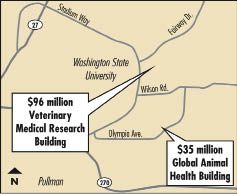
Home » Lydig, Bouten land big WSU jobs
Lydig, Bouten land big WSU jobs
Contractors lead Pullman projects worth $131 million

October 1, 2009
Washington State University says it has selected two Spokane contractors to construct separate projects on its Pullman Campus with a combined value of $131 million.
Lydig Construction Inc. has won a contract to build WSU's planned $96 million Veterinary Medical Research Building, and Bouten Construction Co. has won a contract to erect the $35 million Global Animal Health Building, says Virgil Hanson, WSU's project manager.
Those costs include equipping and furnishing the buildings, Hanson says. The construction costs alone are estimated at $54 million for the Veterinary Medical Research Building and up to $28 million for the Global Animal Health Building, Hanson says.
Both companies will act as general contractors and construction managers on their respective projects, he says. The university is negotiating preliminary details with the contractors on both projects.
Hanson says he expects construction of the planned four-story, 128,000-square-foot Veterinary Medical Research Building to start next summer. The project, which Portland, Ore.-based SRG Partnership Inc. is designing, will be completed in 2012, he says.
The building will house research programs for WSU's College of Veterinary Medicine and will include fully equipped, environmentally controlled biomedical research and support space. It also will include an indoor animal-containment facility, called a vivarium, which will provide specialized holding facilities for study animals as well as quarantine space.
WSU has identified the Veterinary Medical Research Building as its top capital priority at Pullman. It expects to house critical neuroscience, heart-muscle, and bioengineering research and education programs there that will provide human-health as well as animal-health applications.
Up to 40 faculty members will be moved into the building along with 200 graduate students, post-doctoral biomedical researchers, and technicians that would participate in research. Researchers currently are crowded in obsolete facilities elsewhere on campus, the university says.
The structure will be on the north side of the campus, adjacent to the $73 million Biotechnology-Life Sciences Building, which Lydig recently completed.
The Veterinary Medical Research Building will be the third—and most expensive—of six buildings envisioned in a master plan for a research and education complex on that portion of the campus.
Future buildings would house programs in agriculture and other research disciplines.
The Global Animal Health Building will be located near the Veterinary Teaching Hospital on the south side of campus, Hanson says.
Hanson says he expects that construction of the three-story 23,000-square-foot structure will start next spring and be completed in mid-2112. Zimmer Gunsul Frasca Architects LLP, of Seattle, is designing the project.
The project is being funded in large part through a $25 million grant from the Bill & Melinda Gates Foundation, of Seattle.
The building will be the centerpiece for WSU's recently created School for Global Animal Health, the university says.
Research to be conducted in the Global Animal Health Building will help the state address multiple priorities relating to "health, security, economic vitality, safety, and natural resources," as emphasized in the state Office of Financial Management's report on priorities of government, WSU says.
Such research, for example, will aid the mission of the Washington state Department of Health to protect residents from diseases transmitted from animals to humans such as bird flu, West Nile virus, and salmonella, the university says.
The project also will promote infectious disease surveillance to protect people and animals, rapid response to high-risk disease outbreaks, and teaching and research collaboration in testing for diseases and developing vaccines.
"No other university has taken such a bold step to address some of the most significant health issues worldwide through intervention at the animal-human interface," WSU says.
The Global Animal Health Building will enhance the potential for long-term economic benefit through WSU's research partnerships with the University of Washington, the Fred Hutchinson Cancer Research Center, and other research institutes and health organizations, WSU says.
Latest News
Related Articles




